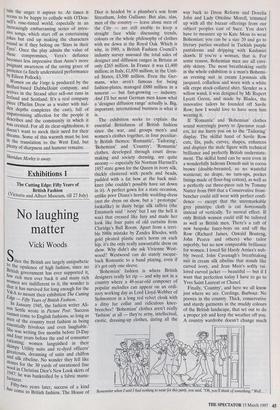Theatre
Romance, Romance (Gielgud)
Women on the Verge of HRT (Vaudeville)
Pastime of the idle rich
James Treadwell
The title of this latest musical advertis- es unabashed sentimentality, but the audi- ence is treated to something much more interesting in the course of a superbly pre- sented evening. Love barely rates a men- tion: romance here is the pastime of the idle rich. Barry Harman and Keith Herr- man's show consists of two one-act vignettes; the first set among the bored haute bourgeoisie of fin-de-siecle Vienna, the second portraying a night in the life of holidaying yuppies from New York. Each features a pair of romancers (Caroline O'Connor and Mark Adams) drifting into dangerous liaisons largely through a lack of anything else to occupy themselves with.
The Viennese pair, adopting disguises in order to conduct their affairs, do at least have the advantage of knowing that they are fooling themselves. The New Yorkers (who, incidentally, seem to be engaged in a `This one was definitely a vegetarian' private duel over which of them can wear the most bizarre trousers) take themselves and their passions more seriously. They're wrong, though; with its marvellously imagi- native staging, it's the urbane comedy of the first part which has the potential to be genuinely moving. In part two we are in more predictable territory, and the threat of emotional distress is consequently never as real as the characters like to pretend. There are, however, some clever parodies of the overwrought and melodramatic sound of big band musicals in the second half, as if to remind everyone that romance is something you play at. Both stories have a pleasingly wry edge, inherited from their turn-of-the-century sources (Schnitzler and Renard), and accented by Steven Dexter's thoughtfully detailed direction. All the performances are strong; O'Connor is superb, hilariously flighty in the first part and persuasively vul- nerable in the second. The music eschews Lloyd Webberism, preferring to keep emo- tions understated (watch out especially for the delicate sadness of 'Small Craft Warn- ing'), and there is some real bite to the wit- tiness of the lyrics, in contrast to the prevailing belief that a few funny rhymes are all that is required to make a musical sound sophisticated. Schmaltz ends tri- umphant, of course: this isn't Sondheinl. Still, as the characters belt out the final number proclaiming their right to hang on to their 'Romantic Notions', they do so in the knowledge that only their unromanti- cally contented marriages allow them to have such risky notions at all. Like its well-heeled characters, Romance, i Romance can afford its compromises; it toys with jaded disillusion, only to dispel it in the closing ensemble. By contrast, Marie Jones's likable Women on the Verge of Ho wants to take a more searching and hard- headed look at what happens when romance runs up against realism. The play opens with wonderful video footage of Irish superstar crooner Daniel O'Donnell and the army of adoring female fans, mostly middle-aged, who queue outside his home in County Donegal. We are then intro- duced to two of these pilgrims: fiftysome- thing Anna, surviving a dreary marriage on regular doses of O'Donnell's affection for his audience, and fortysomething Vera, whose view of human relationships has been soured by her ex-husband's remar- riage to a (much) younger woman. Vera (played by the author herself) rages at the injustices suffered by menopausal .
women, damning unfeeling nature and uncaring males; her refusal to resign her- self to a life without either romance or Sex provides the play with its claim to passion and sincerity. But the story can't quite decide whether her realism is an asset or a handicap. There are moments of real gritty pathos, when we are made to appreciate the cost of Vera's disillusioned apprecia- tion of what the world she lives in is really like. However, the play doesn't always sus- tam the anger it aspires to. At times it seems to be happy to collude with O'Don- nell's rose-tinted world, especially in an increasingly embarrassing series of intru- sive songs, which start off as entertaining Jokes but end up making the characters sound as if they belong on 'Stars in their Eyes'. Once the play admits the value of these compromises, Vera's defiance becomes less impressive than Anne's more Poignant awareness of the saving grace of pretence (a finely understated performance by Eileen Pollock). Women on the Verge is produced by the Belfast-based DubbelJoint company, and arrives in the Strand after sell-out runs in Ireland and Scotland. It's a real company Piece (Phelim Drew as a waiter with hid- den depths completes the cast), full of unpatronising affection for the people it describes and the community in which it was created. For all its clear-sightedness, it doesn't want to mock their need for their dreams. Some of this warmth must be lost in the translation to the West End, but plenty of sharpness and humour remains.



































































 Previous page
Previous page